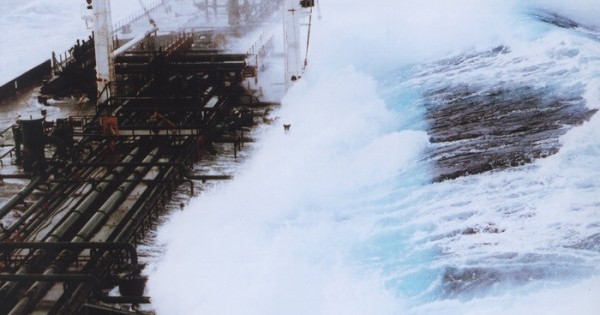
I’ve never seen a rogue wave. I never hope to see one. Many mariners who have seen one did not live to report back. What is a rogue wave? It’s a wall of water appearing from nowhere, towering over surrounding seas, racing toward your vessel from an unexpected direction. It’s a freak that reaches heights of 60 or even 90 feet, a wave 10 stories high that arrives with a deep trough at its base. Rogue waves are killer waves, swamping and at times breaking up cargo vessels, yachts, fishing boats.
How often does this happen? A scientist’s shocking statement, quoted in Susan Casey’s book The Wave, is that on average, worldwide, two large vessels sink each week from all causes.
Is this apocryphal, even mythical? I have no idea. But if you dream of going to sea, best check out the Daily Vessel and Casualty Report at CargoLaw.com. In one month last year (August 2011), for example, fires on board, pirate attacks, collisions, allisions (when a moving boat rams a stationary boat), explosions, engine failures, and runnings aground sank 17 vessels to the bottom of the deep blue sea, one of them in “bad weather and rough seas.” It’s dangerous out there.
What is a wave? Moving water it is not. A wave is a repeating disturbance—energy—moving through a medium. As energy delivered by wind or current passes through the water, individual water molecules move in small circles in place, making little orbits under the wave.
In a storm on December 12, 1978, the state-of-the-art German cargo vessel Munchen sent out a call for help: mayday, mayday, mayday. To the Munchen, storm waves were nothing—ripples in the pond, child’s bathtub play. Responding to the Munchen’s mayday, a massive search launched. Ships. Planes. They expected to find a disabled vessel; they found instead an empty sea and an interesting wrecked lifeboat. This lifeboat had hung suspended on the ship, 66 feet above water level. Its bent attachment pins illustrated that it had been hit “by a tremendous force.”
At the time, scientists did not believe the tall tales of sea captains and sailors, tales of mythical waves, waves out of nowhere, waves so big they might have been made by Poseidon himself, still furious, perhaps, after his gig expired as sea god for the ancient Greeks. Scientists didn’t believe in rogue waves because they understood in detail how waves work, and in the grammar of the ordinary wave, the rogue wave is impossible.
The rogue wave is not an ordinary wave.
But it’s becoming more common. The ocean is warming up, causing storms to rage with more fury, causing rogue waves to rear up higher and more often. Satellites now record their regular occurrence. Shipping is becoming even more dangerous.
A mother lode of data was provided when a British scientific vessel, RRS Discovery, was caught for a week (in February 2000) in a storm in the North Atlantic. The skilled crew battled for survival while the storm flung the researchers from wall to cabin wall. Through it all, the instruments kept working, recording extreme waves of up to 95 feet, before the vessel made it home.
A rogue wave gathers energy. It may gather energy from waves converging from different directions, waves that build up rather than break up as parallel waves do. Or in a storm, a wave train may hit a current going in the opposite direction. This slows down the wave train and another catches up to it, adding its energy.
And then it starts to roll.

